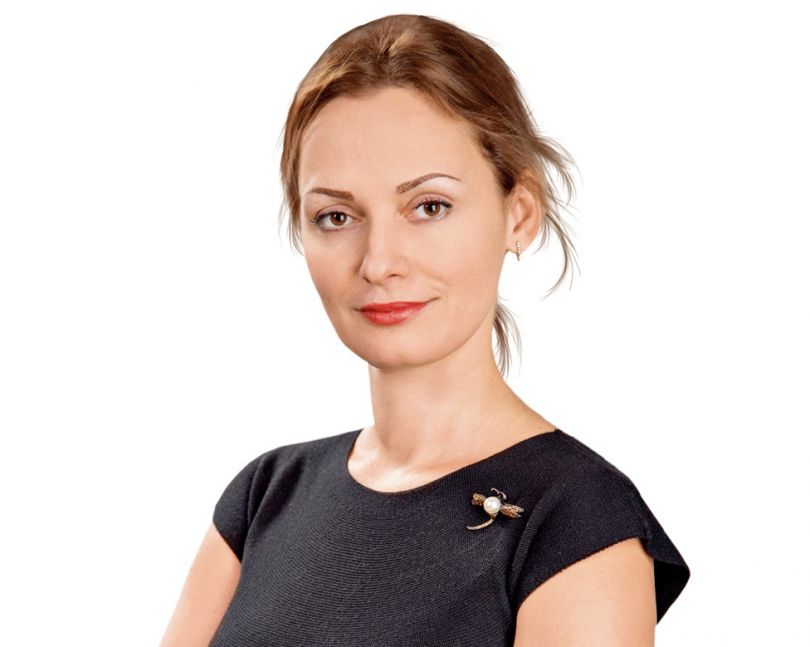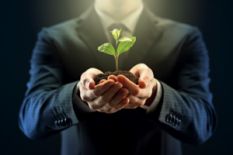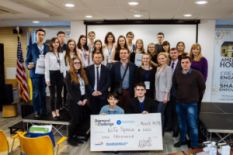
– In your opinion, what is a peculiarity of agribusiness?
I do not think that agribusiness is fundamentally different from any other business. If you want your products or services to be purchased, they should be of some value to a customer, they should be unique. In this context, we deliberately choose the term "value" rather than "cost", as in Ukrainian “value” means both “value” and “cost”. Having the image of the Europe’s breadbasket with fertile black soil and ample natural resources, Ukraine remains the supplier of low added value commodities. And a primary materials manufacturer usually gets the smallest marginal profit. Commodities export is often seen as the only panacea. We believe that one could start by creating an interesting business and high quality products appreciated in the domestic market. If you make cheese, then it should not necessarily be better than Italian – it should be a unique Ukrainian product. So, we speak of added value during virtually all the courses, especially at the philosophy & art sessions, exploring a business founder or manager’s personality as part of the Personal Development course. After all, the bigger the visionary’s personality, the more successful the business.
– So, which competencies are needed for a modern agribusiness manager or a successful founder?
Both the founder and the executive should be the leaders. If they lack leadership, they do not fit. The point of a mature leadership is not that you can play a boss. The leader is the one who makes decisions and takes full responsibility for them. This is the competence we take into consideration when selecting candidates for the AgriFood MBA program.
– What is special about this program and how it differs from others?
This is a brand new educational product on the Ukrainian market. The program is based on the deep understanding of the Ukrainian agrifood ecosystem, the best management practices across the world and global trends in the agricultural sector. We strive to teach AgriFood MBA participants to better understand and develop not only their own business, but also to identify and lead the entire ecosystems.
The educational process is divided into 16 modules, three of which will be held abroad. Program participants, besides the theoretical part, will have a lot of interactive group and individual tasks, business cases and simulations as well as creative improvisations. At the end of the course the participants will get a practical group task: to start up an agrifood cluster initiative, identifying geographically concentrated agrifood businesses with smart specialization (for example, cheese cluster, wine cluster, trout cluster, etc.). By the way, some ideas proposed by our participants have already attracted potential investors.
We have deliberately chosen English as a working language since we are focusing on international groups, and foreign students have already approached us. In addition, we want the Ukrainian agribusiness to be integrated into global environment. We want to contribute to the formation of the Ukrainian intellectual agricultural elite, providing a networking platform for our participants to communicate with Ukrainian and international scientists, economists, founders of companies, successful business people. This was the idea I came up with creating Ukrainian Food Valley, a non for-profit NGO. Both KMBS and some of our alumni supported it and in January 2017 a community of conscious agrifood businesses and organizations was set.
– Who is the target audience of your executive program?
We work with those people who deliberately chose agribusiness, who seek to develop and change it qualitatively. Most of the AgriFood MBA participants are founders of small and medium-sized companies, as well as top managers of large Ukrainian and international agricultural companies. Our requirements – fluent English and more than three years of executive positions. But the internal need and thrive to study is the decisive factor for the candidates.
Agribusiness requires high erudition and multifunctionality. You need to be a bit of everything – agronomist, technologist, chemist, biologist, mechanic, manager and financial director. You need to understand how ERP systems work and be aware of AgTech innovations. You need to understand how Exchange markets and trade work – all this is a very intellectual work. In addition, the specifics of agribusiness is always associated with greater risks due to unpredictability of weather and limited time of the farming season. But despite all the difficulties and risks, it does not turn the farmers out of their business – they invest in it, develop it and, most importantly, believe in it. Do you know what is the difference between AgriFood participants and other MBA students (except the age – our students are little younger)? It is passion for agriculture, high internal motivation and a keen interest in the future development of the sustainable agrifood system.
– The slogan of KMBS is: Change yourself. Change your company. Change the world. What could be the role of Ukrainian agribusiness in this chain?
I believe that people are our greatest potential. We have Ukrainian farms where the whole dynasties of farmers have been working since their great-grandparents. The latest generations understand the modern philosophy of agribusiness and share global sustainability values. They want to create and give, to bring benefits and joy with their businesses to themselves, their families and the world. When the critical mass of such people is created, it will be a powerful driving force that, having changed itself and its company, will change the country, and after that – the entire world, creating common transparent values.
Natalia Kyrylenko
Photo: shutterstock (1), provided by Nataliia Gordiichuk








